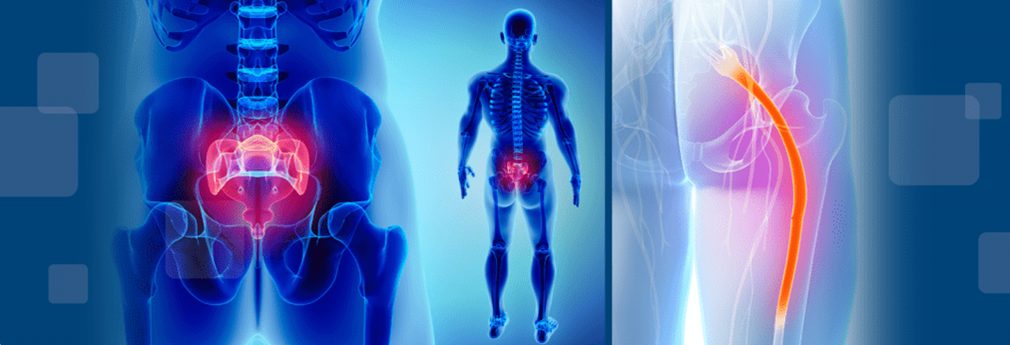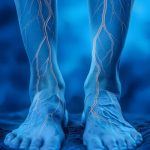Sciatica is a specific kind of back pain that can be debilitating in severe instances. It’s also one of the most common complaints treated by the team at Wesley Chapel Spine and Sports Medicine. It’s caused by the sciatic nerve, the biggest nerve in the body. This nerve extends from the lower back to the buttocks, hips, and down the legs. However, when a patient is suffering from sciatic pain, they usually only have it on one side of their body.
Sciatica can be caused by a few issues, but the most common is when the nerve gets compressed by a narrowing spinal canal. This narrowing of the spine is called spinal stenosis, and it’s a relatively common condition. However, sciatica can also be caused by a herniated disc or bone spur. Back pain is a common indicator of sciatica, but this issue can also present as a numbness and pain down the leg.
The good news is that a lot of time sciatica pain goes away by itself after a few weeks. Nevertheless, the pain can be very severe during this time. In some cases, it can also cause changes in the bowel or bladder, or weakness in the leg, and in these rare cases you may need surgical intervention. Sometimes sciatica is chronic, especially if you regularly partake in activities that exacerbate the pinched nerve or herniated disc. Regardless of whether your sciatica is acute or chronic, pain management is available with minimally invasive and safe procedures.
Signs You Have Sciatica
Only a doctor like the board certified Physicians at Wesley Chapel Spine and Sports Medicine can diagnose and treat Sciatica pain, but there are a few common symptoms that let you know that you probably have it. If your pain begins in the low back and extends along the buttocks to the back of the leg, that’s the common presentation of sciatica. The pain can be mild, moderate, or severe, and is usually worse after you’ve been sitting for an extended period, or when you cough or sneeze. You might notice a numbness, tingling, or weakness in the affected leg and foot, too.
You don’t need to wait to see your primary care physician if you suspect you have sciatica. Any of the Board Certified Physicians at Wesley Chapel Spine and Sports Medicine can evaluate and diagnose you with Sciatica. Since the pain can be severe, sciatica can keep you from your daily tasks and it’s important to have the pain treated. See your doctor immediately if your suspected sciatica is from a traumatic injury, if you have trouble controlling your bladder or bowel movements, if the pain in the lower back is sudden and sharp, or if there’s numbness or weakness in the leg.
Who’s at Risk for Sciatica?
Nearly anyone can suffer from sciatica, but those with jobs that involve driving for a long time, carrying heavy items, or twisting your back are more likely to develop sciatica. Those who are older are also at a higher risk, as is anyone with a sedentary lifestyle.
If you’re overweight or have diabetes, you’re also more likely to be diagnosed with sciatica. In most cases, sciatica isn’t dangerous, but it can cause permanent damage to the nerves if it’s not monitored by a doctor. You can’t always prevent sciatica, but you can reduce your chances of developing it with good posture and regular exercises that help strengthen your back. However, if you already think you have sciatica, it’s important to work with a pain management team to get your pain under control while you work on avoiding future sciatica issues.
What to Expect From a Sciatica Treatment
During your detailed evaluation, your doctor will give you a physical exam to test your muscles and reflexes which may include Electrodiagnostic testing like an NCV/EMG. Severe or chronic pain may require imaging studies, like an x-ray or MRI. Once you’ve been diagnosed with sciatica, you might be a good fit for a variety of treatments including Epidural Injections, Chiropractic, Spinal Decompression, Acupuncture and physical therapy.
Prescription medications are recommended in certain cases, although an expert pain management doctor won’t recommend drugs that have a high risk for dependency except in severe cases. Surgery is rare, but may be recommended when sciatica affects the bladder, causes weakness in the leg, or doesn’t respond to other treatments. This usually involves removing the bone spur or herniated disc that’s compressing the nerve. If you have any type of pain, know that help is available.
Call the team at Wesley Chapel Spine and Sports Medicine today at (813) 994-0151 and schedule your detailed evaluation today.
Treating Sciatica Pain Treating Sciatica Pain































